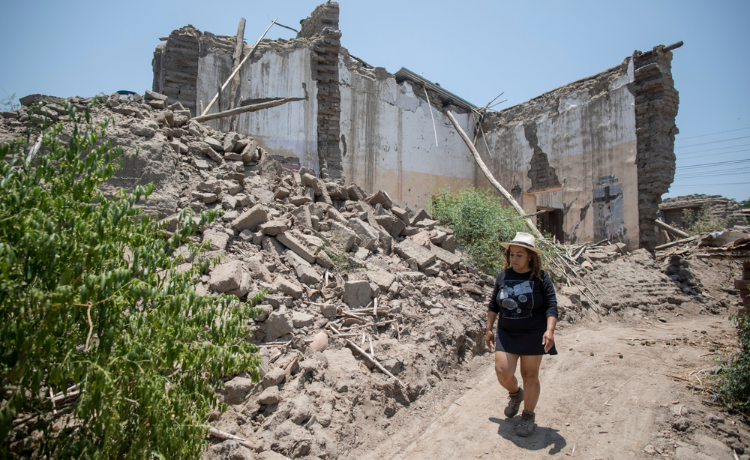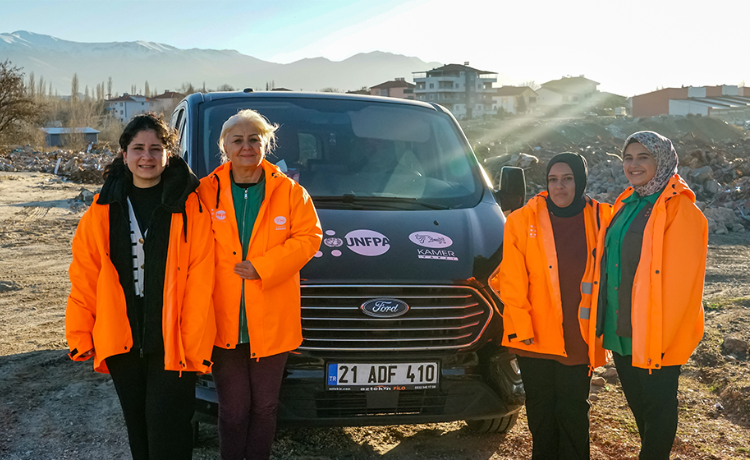News
Meeting women's and girls' needs where they are to prevent and address gender-based violence
- 22 November 2024
News
UNITED NATIONS, New York – Too often, when conflict and crisis force women and girls to flee their homes, gender-based abuse follows close behind. Amid the chaos of displacement, the threat of violence by armed actors, strangers in temporary shelters and even intimate partners stalks them.
Through it all, UNFPA’s dedicated network of partners seek to meet women's needs where they are and to respond to their urgent needs: For medical services and information, psychological support and solidarity, protection from gender-based violence – and access to justice.
Below, read about six heroes carrying out this critical work around the world to put an end to gender-based violence everywhere, and for everyone.
Committed to reaching survivors in Ethiopia
As conflict in Ethiopia’s Tigray region has intensified, incidents of sexual violence have skyrocketed. But overwhelmed health and justice systems have been able to offer little solace to survivors. Into this gap has stepped health worker Sister Kahsa Hagos, who knew women and girls needed a safe space to heal and recuperate from abuse.
With support from the Bureau of Women's Affairs and the Women's Association of Tigray, Sister Hagos established a waiting home for survivors, using her own salary to supplement its stock of necessities like cookware. “Sometimes, we wouldn’t be able to pay rent for months, but we kept going,” she told UNFPA. “I am committed to dedicating my life to survivors’ service."
Displaced but determined in Nigeria
“The water reached up to our chests,” community mobilizer Fatima Ali told UNFPA. She lives in Maiduguri, the capital of Borno State in Nigeria, where relentless rains and flooding led to the collapse of the Alau Dam in October 2024.
Ms. Ali works with UNFPA to improve knowledge about sexual and reproductive health and rights and to support survivors of gender-based violence. Though displaced by the crisis herself – she and her husband were forced to seek out temporary housing – her commitment to supporting women and girls never wavered.
“Even with the flood, I still go to work,” she said. “The reason is that I want to encourage other women.”

Standing with survivors in Perú
“Without light, water, internet and telephone services, how could we seek help? Who would listen?” Afrodescendent farmer, craftswoman and women’s rights activist Lilian León told UNFPA.
Ms. León lives in Yapatera, a small village in the Piura Province of Perú known for having one of the largest communities of Afrodescendent people in the country – and for being wracked by recurrent climate catastrophes.
When the rains and floods come, Ms. León works to identify cases of gender-based violence in her community, and to connect survivors with care and expertise. Having suffered abuse herself, she explained, “I was able to find a way out on my own. But some women need help because they feel alone.”
Safeguarding rights and lives through inclusion in the Philippines
Janine Cruzet runs a women’s disability rights group in the Philippines, one of many low-lying island nations that are home to millions of people at the forefront of the global climate crisis.
Women and girls are paying a heavy toll in the face of climate change – one that is heavier still for persons with disabilities. Speaking of a friend with a visual impairment, Ms. Cruzet explained, “When a typhoon approaches town, the evacuation centre is a whirlwind of activity – but for [my friend with a disability] it is a maze of inaccessible bathrooms and scarce hygiene supplies.”
“Disaster preparedness must be inclusive and considerate of diverse needs,” she added. “It’s about safeguarding the rights and dignity of all individuals, regardless of ability, in times of crisis.”
Changing minds and lives in Somalia
Somali doctor Shuceyb Abdikadir Ali was once such a fervent proponent of female genital mutilation that he conducted the harmful practice himself. But it also caused him deep pain that has yet to recede. “My 8-year-old sister suffered from the harm caused by female genital mutilation and eventually passed away due to excessive bleeding,” he said.
With UNFPA support, Dr. Shuceyb has transformed into a strong advocate against the procedure, which nearly all Somali women and girls aged 15 to 49 have been forced to undergo. As part of this work, he raises awareness about the harms of the practice among internally displaced women in the country.
“From now on, my goal is to prevent the suffering of girls,” he told UNFPA. “We are the ones who perform female genital mutilation and we have to stop it.”

Creating a safe space in Türkiye
“She was my ray of hope,” 47-year-old single mother Zeynep* told UNFPA.
When two earthquakes struck Syria and Türkiye on 6 February 2023, Zeynep’s home and all of her belongings were destroyed. With nowhere to go and in desperate need of care – especially for her son, who was struggling with substance abuse issues – Zeynep sought shelter and support at a UNFPA-supported safe space for women and girls in Malatya, Türkiye. There, a health worker named Nilüfer Kısak became her “angel”.
In the aftermath of the earthquakes, Ms. Kısak and her team have worked constantly to provide survivors like Zeynep with compassionate care. “We have never stopped; we are reaching every corner, every district, and will continue to do so,” she said.